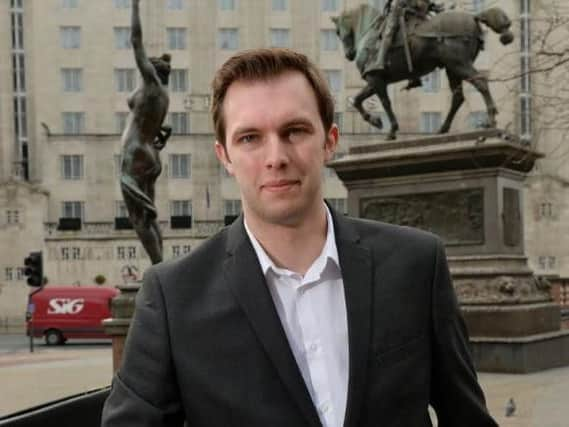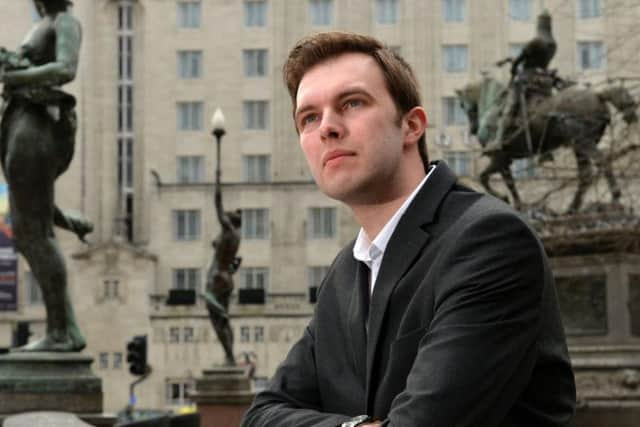Yorkshire Party leader Chris Whitwood: Small parties can still make a huge difference


The race to replace Theresa May as Conservative leader may be the talk of the chattering classes at Westminster, but a little closer to home another political party has managed its succession with the minimum of fuss.
Stewart Arnold, who set up the Yorkshire Party with two others in 2014 to lobby for a Yorkshire Parliament or assembly, announced last month that he was moving on, citing other senior figures who “want to take the party in a different direction”.
Advertisement
Hide AdAdvertisement
Hide AdAlmost immediately, the party’s website revealed that a replacement had been appointed in the form of 27-year-old former primary school teacher Chris Whitwood.


Mr Whitwood is apparently the youngest leader of a political party in the country, and jokes as he sits down with The Yorkshire Post at a cafe in Leeds that he hopes he hasn’t “aged too much in the last week or so”.
He has plenty of work to do, combining his efforts to help build a policy platform for his growing party with his job working for a company designing teaching resources.
Advertisement
Hide AdAdvertisement
Hide Ad“I’ve been incredibly moved by the messages of support received, not just from members but from people outside the party. The Yorkshire Party itself is quite a new party, the members are quite young as well. The average age of candidates in the 2017 election was 35. I would wager that is one of the youngest averages.
“It’s very much a team effort. We have excellent spokespeople we want to bring to the fore a little bit more. With smaller parties it is easy to appear like it is a one-man band, it absolutely isn’t.
“Membership is in the hundreds and increasing very rapidly. Devolution is very important to us, it is the principle of subsidiarity, passing decisions down is very important. But we’re about a lot more than that, ultimately it is a hope that we can make people’s lives in Yorkshire better.”
Born in Leeds and educated in York, Mr Whitwood tells how he got into politics “almost by chance”. A member of the national youth advisory board for St John Ambulance at the time of a spate of inner city stabbings in 2008/9, he helped set up a youth project to teach first aid to people in areas of high knife and gun crime.
Advertisement
Hide AdAdvertisement
Hide AdRunning the groups in deprived areas of East London - at that time yet to be gentrified by the arrival of the Olympic stadium - “affirmed my belief that first aid is something everyone should be able to do”.
The group’s lobbying efforts, involving approaches to MPs, peers and Ministers, culminated in him standing on stage at the 2014 Liberal Democrat party conference proposing a motion that first aid should be part of the school curriculum.
The idea has gradually gained traction and from 2020 onwards, all state-funded schools in England will be required to teach first aid as part of health education.
Advertisement
Hide AdAdvertisement
Hide Ad“It was seeing that we as 16,17, 18-year-olds could do something to try and prevent other young people dying. To see that we as teenagers could contribute to a change in legislation that could save hundreds if not thousands of lives, gives me hope for the positive role politics can play.”
Now living in South Yorkshire, he has a background in product design after studying it at university but later took a teaching qualification. It was the former interest - he says he likes things ‘that look nice and work’ - that brought him into contact with the Yorkshire Party as he offered to do graphic design work for the nascent organisation.
Elected deputy in 2016 when Stewart Arnold became leader, he stepped up to the top role last month. With a full leadership contest after May’s local elections, will he be throwing his hat into the ring? “Possibly. I couldn’t possibly comment.”
In his statement announcing his departure, Mr Arnold said the subject of Brexit had “dominated politics since the referendum in 2016” and “squeezed the life blood out of political debate”. Referring to those “drawn by the short term electoral gains of taking a pro or anti-Brexit stance”, he said: “That has never been what the Yorkshire Party has been about”.
Advertisement
Hide AdAdvertisement
Hide AdMr Whitwood plays down any suggestion of a rift but suggests there were differences in opinion on “the extent to which Brexit is dominating politics”.
“My read of it was that Brexit is dominating everything at the moment, the party is completely united in terms of our stance. We adopted a neutral approach in 2016. We represent people who voted remain and leave. Our ultimate ambition now is to make sure that whatever the outcome Yorkshire has a greater say and to start healing that divide.”
Though he is not standing in this year's local elections - with none taking place in Rotherham this year - Mr Whitwood has high hopes for his party.
It will be fielding around 50 candidates, double last year's total, with a "fair spread" across the region. Its best result in last year's election was Mick Bower securing 22,318 votes - almost 10 per cent of the vote - in the Sheffield City Region mayoral poll, and last July it gained it first sitting councillor in Selby when Mike Jordan joined from the Conservatives.
Advertisement
Hide AdAdvertisement
Hide AdThe party now has spokespeople in all major policy areas, including transport, education, healthcare and communities. Devolution, he says, remains at the core of everything the party does but it ultimately a means to an end, allowing people in Yorkshire more say over issues that affect their lives and a chance to effect change in the region.
“The best way to articulate that is a regional assembly,” he says. “We are moving in the right direction. In 2014 no-one was talking about regional devolution at all. Even though the Government have been resistant to the idea, the fact so many councils, so many business, people like the Archbishop of York, are so resolute in their belief that this is the right way to go, that’s a real positive.
"It is incremental steps but steps in the right direction. Ultimately we will and should end up with a devolved assembly like London, where you can represent the entire region rather than a single individual in power.”
Admitting that there are “certainly easier ways to get rich and famous than building a political party from scratch”, Mr Whitwood insists his party can make a difference in the increasingly fractured and polarised politics of 2019.
Advertisement
Hide AdAdvertisement
Hide Ad“Part of me just wishes [Westminster politicians] could get their act together so I could say ‘I have complete faith in them, I can go back to having weekends and things’,” he says.
“From a party perspective it’s a golden opportunity, people are starting to question whether a very London-centric Parliament is the right way to go or are there are alternatives out there. We have seen in the past decade or so that small parties can make a huge difference and carry a huge amount of influence. I think that is the way British politics is heading.”